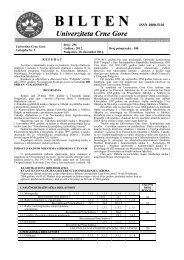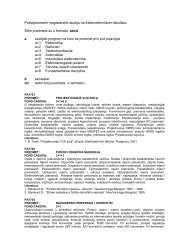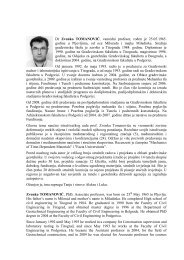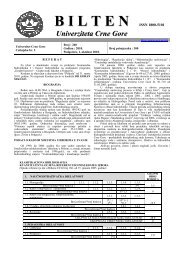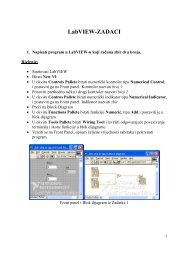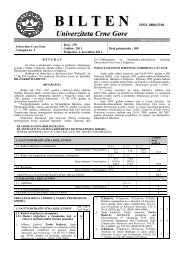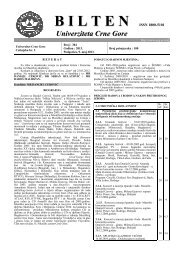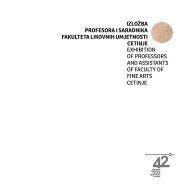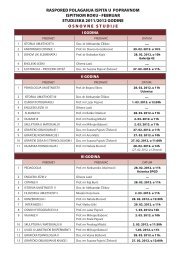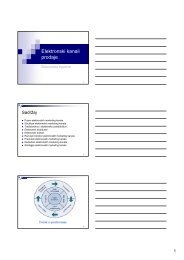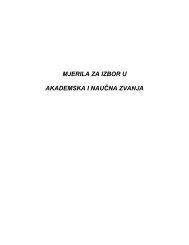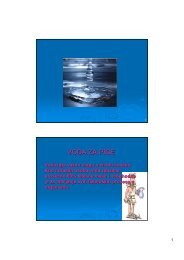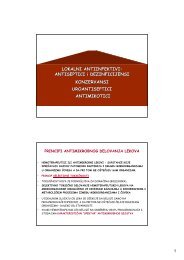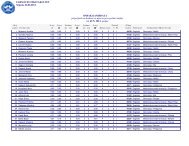WHO monographs on selected medicinal plants - travolekar.ru
WHO monographs on selected medicinal plants - travolekar.ru
WHO monographs on selected medicinal plants - travolekar.ru
You also want an ePaper? Increase the reach of your titles
YUMPU automatically turns print PDFs into web optimized ePapers that Google loves.
<str<strong>on</strong>g>WHO</str<strong>on</strong>g> <str<strong>on</strong>g>m<strong>on</strong>ographs</str<strong>on</strong>g> <strong>on</strong> <strong>selected</strong> <strong>medicinal</strong> <strong>plants</strong><br />
c<strong>ru</strong>de d<strong>ru</strong>g to the culture medium at a c<strong>on</strong>centrati<strong>on</strong> of 50.0 μg/ml (25).<br />
In vitro studies have dem<strong>on</strong>strated that Vibrio cholerae grows in a medium<br />
c<strong>on</strong>taining berberine, but fails to produce diarrhoea-inducing toxins<br />
(26). It has been hypothesized that the antidysenteric activity of berberine<br />
is due to localized effects <strong>on</strong> the intestinal tract and not due to bactericidal<br />
activity. The suggested mechanism by which berberine exerts its<br />
antidiarrhoeal activity is through the activati<strong>on</strong> of 2<br />
-adrenoceptors and<br />
by reducing producti<strong>on</strong> of cyclic adenosine m<strong>on</strong>ophosphate through the<br />
inhibiti<strong>on</strong> of the activity of adenylate cyclase (27), which in turn decreases<br />
intestinal motility (28). Berberine inhibits in vivo and in vitro intestinal<br />
secreti<strong>on</strong>s induced by cholera toxin (29–32).<br />
Berberine at a c<strong>on</strong>centrati<strong>on</strong> of 10.0 mg/loop reduced intestinal secreti<strong>on</strong><br />
stimulated by the heat-labile toxin of Escherichia coli in the rabbit<br />
ligated intestinal loop model by 70% in situ, and inhibited the secretory<br />
resp<strong>on</strong>se of the heat stable toxin of E. coli in mice (33, 34). Berberine at<br />
c<strong>on</strong>centrati<strong>on</strong>s up to 500.0 μM stimulated i<strong>on</strong> transport resp<strong>on</strong>ses in human<br />
col<strong>on</strong>ic mucosa that were n<strong>on</strong>-specific for calcium i<strong>on</strong>s or cyclic adenosine<br />
m<strong>on</strong>ophosphate-mediated signals. In cultured intestinal epithelial<br />
m<strong>on</strong>olayers, berberine inhibited calcium and cyclic adenosine m<strong>on</strong>ophosphate-mediated<br />
resp<strong>on</strong>ses, indicating that the d<strong>ru</strong>g exerts a direct antisecretory<br />
effect <strong>on</strong> the epithelial cells through the inhibiti<strong>on</strong> of mucosal<br />
chloride secreti<strong>on</strong> (35).<br />
Antihypertensive activity<br />
Administrati<strong>on</strong> of a lyophilized aqueous extract of the c<strong>ru</strong>de d<strong>ru</strong>g in<br />
drinking-water at a dose of 500.0 mg/kg body weight (bw) to rats for<br />
20 days significantly reduced hypertensi<strong>on</strong> induced by heat stress or the<br />
administrati<strong>on</strong> of metyrap<strong>on</strong>e (p < 0.01) (36, 37). Intragastric administrati<strong>on</strong><br />
of a 70% ethanol extract of the c<strong>ru</strong>de d<strong>ru</strong>g at a dose of 600.0 mg/kg<br />
bw to rats for 20 days reduced blood pressure (38).<br />
Anti-inflammatory activity<br />
A 50% ethanol extract of the c<strong>ru</strong>de d<strong>ru</strong>g reduced 12-O-tetradecanoylphorbol-13-acetate<br />
and acetic acid-induced oedema and inhibited oxazol<strong>on</strong>einduced<br />
c<strong>on</strong>tact-delayed hypersensitivity ear oedema in mice after applicati<strong>on</strong><br />
of 0.5 mg/ear (39). A 50% methanol extract (1:1) significantly<br />
decreased granulati<strong>on</strong> tissues in chick embryo chorioallantoic membranes,<br />
indicating anti-inflammatory activity (p < 0.05) (40). Intragastric administrati<strong>on</strong><br />
of berberine to rats with trinitrobenzene sulf<strong>on</strong>ic acid-induced<br />
colitis at a dose of 7.5 or 15.0 mg/kg/day reduced histological lesi<strong>on</strong>s,<br />
morphological damage and myeloperoxidase activity after 1 week of<br />
treatment (41). Berberine also inhibited the producti<strong>on</strong> of the potent in-<br />
248



